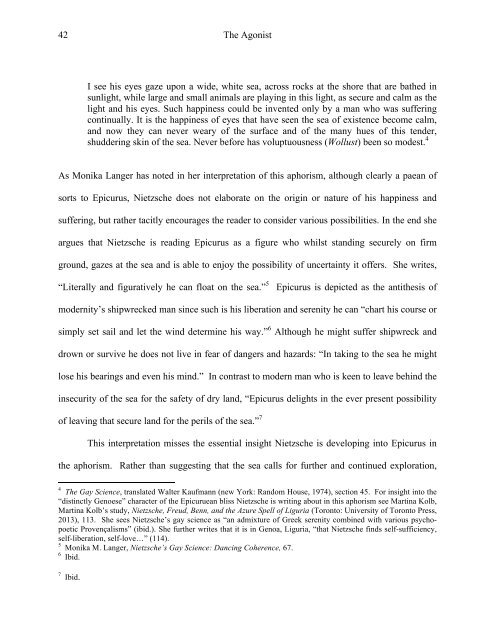Volume X, Issue II, Spring 2017
Agonist Issue: Volume X, Issue II, Spring 2017
Agonist Issue: Volume X, Issue II, Spring 2017
You also want an ePaper? Increase the reach of your titles
YUMPU automatically turns print PDFs into web optimized ePapers that Google loves.
42<br />
The Agonist<br />
I see his eyes gaze upon a wide, white sea, across rocks at the shore that are bathed in<br />
sunlight, while large and small animals are playing in this light, as secure and calm as the<br />
light and his eyes. Such happiness could be invented only by a man who was suffering<br />
continually. It is the happiness of eyes that have seen the sea of existence become calm,<br />
and now they can never weary of the surface and of the many hues of this tender,<br />
shuddering skin of the sea. Never before has voluptuousness (Wollust) been so modest. 4<br />
As Monika Langer has noted in her interpretation of this aphorism, although clearly a paean of<br />
sorts to Epicurus, Nietzsche does not elaborate on the origin or nature of his happiness and<br />
suffering, but rather tacitly encourages the reader to consider various possibilities. In the end she<br />
argues that Nietzsche is reading Epicurus as a figure who whilst standing securely on firm<br />
ground, gazes at the sea and is able to enjoy the possibility of uncertainty it offers. She writes,<br />
“Literally and figuratively he can float on the sea.” 5<br />
Epicurus is depicted as the antithesis of<br />
modernity’s shipwrecked man since such is his liberation and serenity he can “chart his course or<br />
simply set sail and let the wind determine his way.” 6 Although he might suffer shipwreck and<br />
drown or survive he does not live in fear of dangers and hazards: “In taking to the sea he might<br />
lose his bearings and even his mind.” In contrast to modern man who is keen to leave behind the<br />
insecurity of the sea for the safety of dry land, “Epicurus delights in the ever present possibility<br />
of leaving that secure land for the perils of the sea.” 7<br />
This interpretation misses the essential insight Nietzsche is developing into Epicurus in<br />
the aphorism. Rather than suggesting that the sea calls for further and continued exploration,<br />
4 The Gay Science, translated Walter Kaufmann (new York: Random House, 1974), section 45. For insight into the<br />
“distinctly Genoese” character of the Epicuruean bliss Nietzsche is writing about in this aphorism see Martina Kolb,<br />
Martina Kolb’s study, Nietzsche, Freud, Benn, and the Azure Spell of Liguria (Toronto: University of Toronto Press,<br />
2013), 113. She sees Nietzsche’s gay science as “an admixture of Greek serenity combined with various psychopoetic<br />
Provençalisms” (ibid.). She further writes that it is in Genoa, Liguria, “that Nietzsche finds self-sufficiency,<br />
self-liberation, self-love…” (114).<br />
5 Monika M. Langer, Nietzsche’s Gay Science: Dancing Coherence, 67.<br />
6 Ibid.<br />
7 Ibid.









